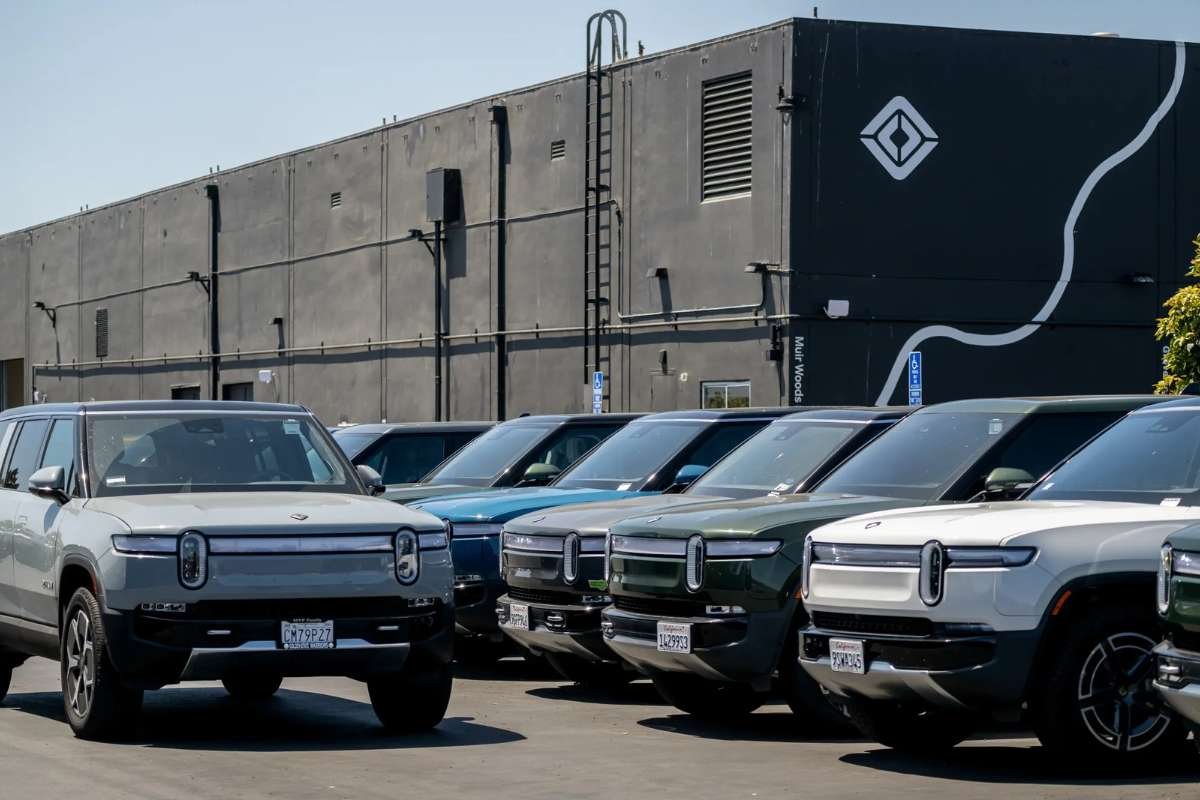Key Points:
- Rivian Shares Drop significantly after the company cut its 2025 vehicle delivery forecast.
- Production Challenges and slowing EV demand contributed to the revised outlook.
- Investor Concerns Rise as Rivian faces pressure to meet growth expectations in a competitive EV market.
Rivian Shares Drop sharply on Thursday after the EV maker released third-quarter delivery figures and lowered its full-year forecast. The decline highlights ongoing challenges in the EV sector, where demand trends and tax credit changes are affecting automakers’ growth expectations.
The Irvine, California-based company reported it produced 10,720 vehicles and delivered 13,201 in the third quarter, according to a regulatory filing. That figure exceeded analyst expectations of 12,000 deliveries, based on FactSet estimates. Despite the stronger-than-expected quarterly deliveries, Rivian cut its 2025 delivery forecast to a range of 41,500 to 43,500 vehicles. This adjustment narrowed the company’s previous guidance of 40,000 to 46,000 units, reducing the midpoint by 500 vehicles to 42,500.
Forecast revision weighs on shares
The revised delivery outlook triggered a sell-off, with Rivian shares dropping 8.1% in early afternoon trading. Volume surged to more than twice the stock’s daily average, pulling shares below their 50-day moving average. Rivian stock remains marginally positive for the year but continues to struggle with volatility amid uncertain EV demand.
The company is set to release its third-quarter financial results on November 4, after the market closes. Analysts expect Rivian to report a loss of 73 cents per share, narrower than last year’s 97-cent loss in the same quarter. Revenue is projected to grow 70.8% year-over-year to $1.49 billion, according to FactSet.
Industry headwinds
Rivian Shares Drop as the company cuts its forecast amid broader EV market challenges, including slowing demand, expiring incentives, and rising costs. A $7,500 federal tax credit for electric vehicle purchases expired on September 29, creating a rush of buyers ahead of the deadline but leaving automakers concerned about near-term demand.
Tesla, for example, reported record third-quarter deliveries of 497,099 vehicles on Thursday, boosted by the now-expired incentive. General Motors also posted a record 66,501 EV sales in the U.S. during the third quarter, but it noted the increase was driven by customers moving quickly to secure vehicles before losing eligibility for the tax credit.
Industrywide, several automakers have slowed or scaled back their EV rollout plans, citing weaker-than-expected demand, supply-chain pressures, and ongoing tariffs. CFRA Research analysts lowered Rivian’s 2025 earnings estimate to a loss of $2.95 per share, down from $2.70, pointing to a “material drop in EV demand beginning in the current quarter.” They also flagged Rivian’s ongoing cash burn and noted that construction of the company’s new plant in Georgia will weigh further on free cash flow.
Analyst sentiment mixed
Rivian Shares Drop amid divided investor sentiment. FactSet data shows eight analysts rate the stock a “buy,” while 16 recommend holding and three have issued sell or underweight ratings. Analysts remain cautious, noting Rivian’s potential in the EV market but emphasizing the risks tied to execution, financing needs, and consumer demand.
Despite the near-term challenges, Rivian continues to build out production capacity. The company’s Georgia plant is expected to increase output and broaden its long-term growth potential, though the near-term financial strain remains a concern for investors.
Broader EV market impact
The news weighed on other EV and auto stocks as well. Tesla shares fell 2.7% despite its record deliveries, retreating from a 2025 high. General Motors stock slid 3.2%, reversing from near multiyear highs. Lucid Group, another EV competitor, is expected to report its third-quarter deliveries this week, with analysts forecasting around 5,000 units. Lucid shares fell 1.1% on Thursday.
For entrepreneurs and business owners, Rivian’s developments reflect the shifting dynamics in the EV industry. While long-term growth opportunities remain, the near-term picture is shaped by fluctuating demand, evolving government incentives, and heavy investment requirements for scaling production. Companies in the sector continue to balance expansion with cost discipline, underscoring the competitive and capital-intensive nature of the EV market.
Rivian Shares Drop ahead of its November earnings release, as investors and industry watchers will be closely monitoring whether delivery growth and new capacity investments can offset the pressure of slowing demand and rising costs. For now, the stock’s sharp reaction underscores how closely tied investor sentiment is to delivery forecasts in the evolving electric vehicle landscape.
Sources:










